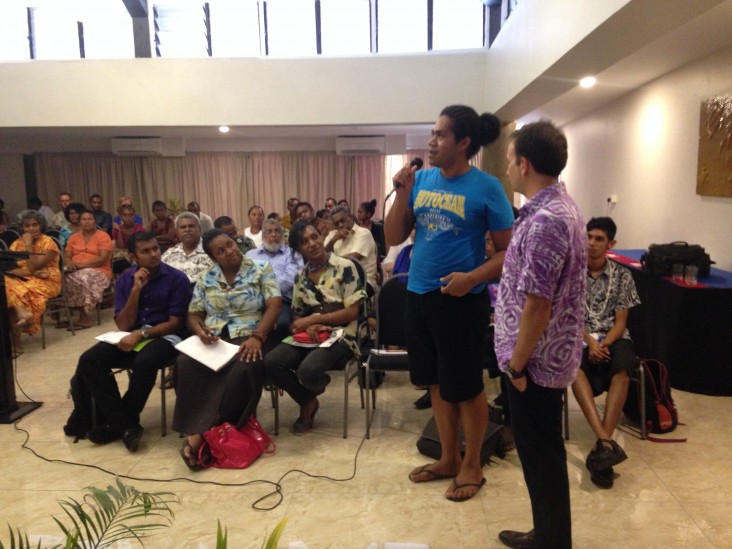
July 2015—In January 2015, Bonita Quio stood before newly elected Fijian parliament members in the country’s first town hall meeting. The monumental interaction between elected officials and citizens was an event months in the making.
Following elections last fall, USAID, the International Foundation for Electoral Systems (IFES) and the International Republican Institute (IRI) trained elected officials to engage with citizens, especially with marginalized people representing rural communities, youth, women, LGBT (lesbian, gay, bisexual and transgender) populations, and persons with disabilities. The same populations were trained to communicate with elected officials.
Officials learned how to take questions, share stories and validate concerns. Constituents learned how to interact with members of parliament, communicate priorities and demand accountability.
At last the two groups came together for the town hall meeting in Lautoka.
Quio, a transgender woman, addressed some of the country’s highest officials, explaining that, despite Fiji’s new constitution that prohibits discrimination on the basis of gender identity or orientation, many LGBT citizens are unemployed and become sex workers to survive.
“We must partner with government to create a safe space for transgender people,” said Quio, challenging parliamentarians to promote legal rights for Fiji’s transgender community and sparking discussion among participants.
“Thank you for your courage,” replied a parliamentarian. “I want to tell you that you are, first, our sons and daughters. You deserve respect, equal rights and to be heard.”
Citizens continued sharing concerns about water supplies, education and employment; parliamentarians were prepared to address these issues and mark items for follow-up action.
“As Fiji’s newly elected parliamentarians enter their first year as leaders, community leaders like Quio must have the skills to advocate for the rights of Fijian citizens,” remarked Terry Rogers, an IFES voter education specialist. “There is an appetite for more events and with broader participation in the future.”
In total, 194 citizens, including 87 women, 12 transgender persons and 86 youth from several provinces participated in three town hall meetings. This enabled members of parliament to interact with segments of Fiji’s population who do not have frequent opportunities to have their voices heard.
“Before, we could only see parliamentarians on television,” said Amelina Nabetelevu, a social worker from Rakiraki. “It is great to be with them and for them to hear our issues.”
Parliamentarians shared this enthusiasm. “I would like to see these meetings continue throughout the country and until the next election,” one remarked. “We must continue this for Fiji to realize full democracy.”
Since the first town hall, one parliamentarian committed to address LGBT challenges. Other organizations requested training materials so more people could participate in the meetings.
In September 2014, Fiji held its first national election since a 2006 coup. To help Fiji transition to a democratic state, USAID launched its Supporting Free, Fair, Honest and Credible Elections in Fiji project in May 2014, working with IFES and IRI to teach people their voting rights and observe the election. Nearly half a million voters turned up on Election Day, representing an 84 percent voter turnout rate.
Although the project closed in January 2015, Fijian citizens and government officials share a drive for democracy, ensuring that people like Quio can shape a more stable, democratic nation.
LINKS
Follow on Facebook







Comment
Make a general inquiry or suggest an improvement.